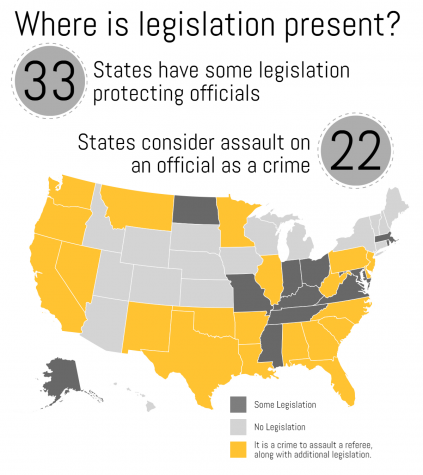Your donation will support the student journalists of West High School. Your contribution will allow us to purchase Scholarship Yearbooks, newsroom equipment and cover our annual website hosting costs.
What’s being done?
November 6, 2016
Thirty-three states currently have legislation in place to protect officials and in 22 states it is considered a crime to assault a referee. Iowa currently has no legislation in place, a bill aimed to add protection for officials recently stalled in the house.
However, according to student referees, at the local level leagues informally try and protect their referees despite the lack of legislation requiring it. “Usually they try and keep an experienced older umpire behind the plate with you so if there’s any question about a call that you made or if you have a question about something you can just call timeout and the umpire will come help you or kind of back you up,” Goodman said. “If there’s a problem with a parent or a coach we can tell [the head empire] and he will handle it.”

Ty Bopp ’17, who referees as a part time job with RedZone football academy, has had a similar experience to Goodman. “[If something happens], they will bring it back to our guy in charge and he goes ‘ok, we’ll just email everyone just saying ‘keep it down.’’’ Bopp said.
Possible legislation is confronted with mixed opinions. “[Officials] are entitled to protection just because they are a person and it’s illegal to assault somebody. But I think it could go a little bit further in that sometimes you are put in those environments where people, for lack of a better term, kind of lose their minds, and I think that makes it a little bit scarier for the referee who has to make that tough call,” Curtis said.
[Officials] are entitled to protection just because they are a person.
— Lewie Curtis
Mathias agrees with Curtis, explaining that “Officials are in a unique position because of the work we do that does make us vulnerable to assault and abuse and I think we would also be deserving of special protection in that case.”
On the other hand, Huegel does not think that adding a law will make much of a difference. “I certainly wouldn’t be opposed to legislation, but I don’t know that legislation would solve the problem. I’m almost certain [in] states that do have laws, they probably still have instances of issues regarding officials,” he said.
Bopp agrees with Huegel. “No, [I don’t think legislation should be in place] because people will always find loopholes for it,” Bopp said.
“We want officials to know at the very start, how they are going to exit if they need to exit quickly.
— Lewie Curtis
On a non-legislative level, steps have been taken to protect referees. For handling protection add West High, Huegel varies actions based on the anticipated intensity of the event. “For example, [for a] home football game, I actually have a teacher in our district, I call him our game day host. He literally takes the officials from their car when they arrive into the locker room to the field and back […] every night we try to have someone especially greet the officials when they arrive,” Huegel said.
The IHSAA and Huegel also work together to promote good sportsmanship. “I think it’s always important to greet the official and have it start off on a positive atmosphere,” Huegel said.
“[We try] to inundate the schools with sportsmanship, positive sportsmanship and how you should conduct yourself. Character Counts initiative that we try to push out to the schools, even simple things like sharing with the announcers the proper way to announce the game,” Curtis said. Character Counts is an initiative for displaying good sportsmanship and character in the community.
It’s a shared responsibility among several groups to not only bring light to it but also reverse the trend [and] provide the necessary support for officials to get into and stay with it. And make it feel like they are part of the game, they have backing, they are supported.
— Joshua Berka
Education of referees by the IHSAA is also taken very seriously. They hold officials clinics, where they learn the basics of officiating as well as how to conduct oneself at an event. “We want officials to know at the very start, how they are going to exit if they need to exit quickly. We try to talk to athletic administrators to make sure that they do the best job that they can do with regard to being nearby the officials so they can help get them out of the facility,” Curtis said.
For an official, the best way to react may be to not react at all, “The best solution is always to avoid them. Unfortunately there are situations where it’s not possible to ignore a fan when they become overly abusive,” Mathias said.
The IHSAA and other officiating associations have also tried to amp up recruiting of officials. Berka also noted the importance of keeping referees after they first start out, “There is a lot of research that’s been done that there’s that tipping point; if they stay in it past a year two then they stay in it for a long time.” Berka said.
In the end the responsibility rests in the hands of not one group but multiple groups working together, “It’s a shared responsibility among several groups to not only bring light to it but also reverse the trend [and] provide the necessary support for officials to get into and stay with it. And make it feel like they are part of the game, they have backing, they are supported.” Berka said.
